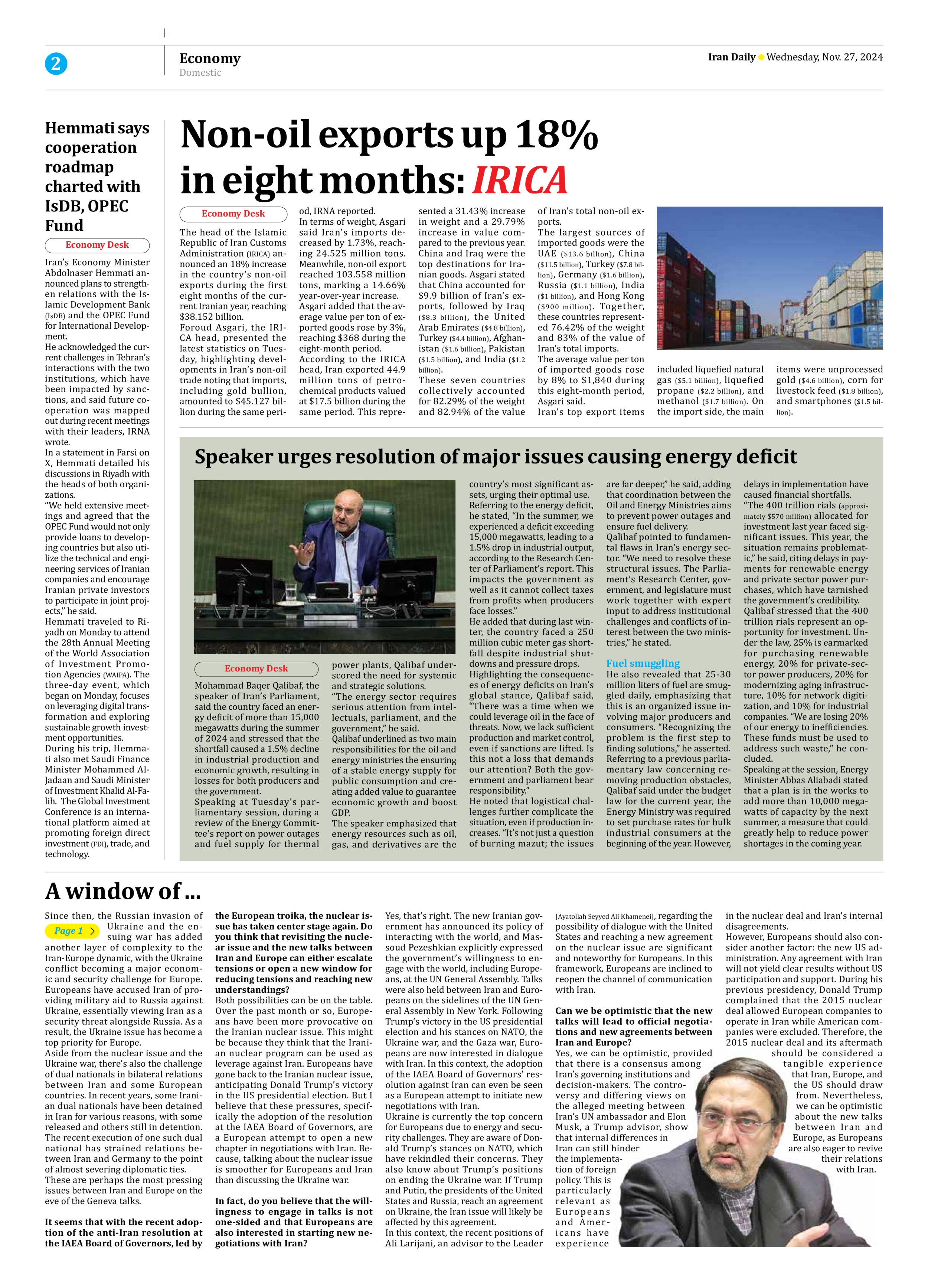
Speaker urges resolution of major issues causing energy deficit
Mohammad Baqer Qalibaf, the speaker of Iran’s Parliament, said the country faced an energy deficit of more than 15,000 megawatts during the summer of 2024 and stressed that the shortfall caused a 1.5% decline in industrial production and economic growth, resulting in losses for both producers and the government.
Speaking at Tuesday’s parliamentary session, during a review of the Energy Committee’s report on power outages and fuel supply for thermal power plants, Qalibaf underscored the need for systemic and strategic solutions.
“The energy sector requires serious attention from intellectuals, parliament, and the government,” he said.
Qalibaf underlined as two main responsibilities for the oil and energy ministries the ensuring of a stable energy supply for public consumption and creating added value to guarantee economic growth and boost GDP.
The speaker emphasized that energy resources such as oil, gas, and derivatives are the country’s most significant assets, urging their optimal use.
Referring to the energy deficit, he stated, “In the summer, we experienced a deficit exceeding 15,000 megawatts, leading to a 1.5% drop in industrial output, according to the Research Center of Parliament’s report. This impacts the government as well as it cannot collect taxes from profits when producers face losses.”
He added that during last winter, the country faced a 250 million cubic meter gas shortfall despite industrial shutdowns and pressure drops.
Highlighting the consequences of energy deficits on Iran’s global stance, Qalibaf said, “There was a time when we could leverage oil in the face of threats. Now, we lack sufficient production and market control, even if sanctions are lifted. Is this not a loss that demands our attention? Both the government and parliament bear responsibility.”
He noted that logistical challenges further complicate the situation, even if production increases. “It’s not just a question of burning mazut; the issues are far deeper,” he said, adding that coordination between the Oil and Energy Ministries aims to prevent power outages and ensure fuel delivery.
Qalibaf pointed to fundamental flaws in Iran’s energy sector. “We need to resolve these structural issues. The Parliament’s Research Center, government, and legislature must work together with expert input to address institutional challenges and conflicts of interest between the two ministries,” he stated.
Fuel smuggling
He also revealed that 25-30 million liters of fuel are smuggled daily, emphasizing that this is an organized issue involving major producers and consumers. “Recognizing the problem is the first step to finding solutions,” he asserted.
Referring to a previous parliamentary law concerning removing production obstacles, Qalibaf said under the budget law for the current year, the Energy Ministry was required to set purchase rates for bulk industrial consumers at the beginning of the year. However, delays in implementation have caused financial shortfalls.
“The 400 trillion rials (approximately $570 million) allocated for investment last year faced significant issues. This year, the situation remains problematic,” he said, citing delays in payments for renewable energy and private sector power purchases, which have tarnished the government’s credibility.
Qalibaf stressed that the 400 trillion rials represent an opportunity for investment. Under the law, 25% is earmarked for purchasing renewable energy, 20% for private-sector power producers, 20% for modernizing aging infrastructure, 10% for network digitization, and 10% for industrial companies. “We are losing 20% of our energy to inefficiencies. These funds must be used to address such waste,” he concluded.
Speaking at the session, Energy Minister Abbas Aliabadi stated that a plan is in the works to add more than 10,000 megawatts of capacity by the next summer, a measure that could greatly help to reduce power shortages in the coming year.







